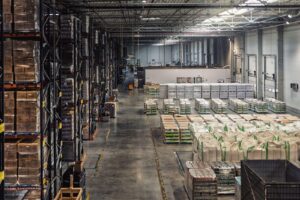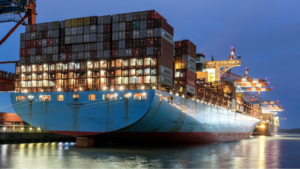Table of Contents:
- What is an Express Consignment Carrier Facility (ECCF)?
- Express Consignment Carrier Facility eManifest Requirements
- Formal and Informal Entry Requirements for ECCF Shipments
- Express Consignment Carrier Facility & Section 321 shipments
- CrimsonLogic Solution for Express Consignment Carrier Facility (ECCF) Shipments
The booming global e-commerce market and the rise in shipping rates are driving businesses to look for alternatives to traditional cargo clearance solutions. High-volume importers are particularly interested to know how to clear shipments at an Express Consignment Carrier Facility (ECCF) as well as affordable local or regional postal service delivery.
What is an Express Consignment Carrier Facility (ECCF)?

Express consignment carrier facilities (ECCFs) are essentially bonded warehouses where U.S. Customs and Border Protection (CBP) and other federal agencies conduct physical inspection and clearance of inbound goods. There’s usually a separate department for domestic and international freight and a team of customs brokers to process entries and entry summaries on behalf of importers. Couriers like FedEx, DHL and UPS operate as ECCFs at major U.S. airports like JFK, LAX and MIA.
An ECCF is a separate or shared facility designated by a port director for the examination and release of express consignment shipments. Express consignment shipments are shipments transported by an express consignment operator or carrier, which uses any mode of transport to move cargo by special express commercial service. Examples are companies like FedEx, UPS and DHL that offer door-to-door package delivery. Express consignment shipments may be accompanied (courier) or unaccompanied.
A business or entity has to be approved by CBP before it can operate as an express consignment carrier facility. Express consignment operators or carriers must be approved as an international carrier and carrier of bonded merchandise. The process starts with an application request in writing that is sent to the port director. The request must contain a full description of the international cargo facilities, including blueprints, floor plans and facility locations, description of the ECCF operations, list of all carriers in the facility, estimated volume of transactions, including formal and informal entries and shipments not requiring entry, list of company officials, start-up date and hours of operation, and application processing fee.
The applicant must also sign an agreement that ensures all cargo will be processed in the Automated Commercial Environment (ACE) and other applicable CBP electronic systems, and a narcotics enforcement agreement with the U.S. Immigration and Customs Enforcement (ICE). For approved facilities, all proposed changes or alterations to an existing facility must be submitted in writing to the port director before implementation.
How to Clear ECCF Shipments: eManifest Requirements
An express consignment operator is responsible for the shipment as if it is the sole carrier. It is also responsible for providing eManifest information to CBP before the shipment arrives in the U.S. This includes information for shipments that do not require a formal/informal entry. Express consignment operators must provide the following information to CBP:
- country of origin of the merchandise
- shipper name
- address and country
- ultimate consignee name and address
- detailed description of the goods
- quantity
- shipping weight
- value
- Harmonized Tariff Schedule of the United States (HTSUS) subheading number if a formal entry is required or informal entry is required but the product is not duty- or tax-free
For shipments that are sorted by country of origin at the ECCF:
- the carrier must submit eManifest data with the merchandise segregated by country of origin
Formal and Informal Entry Requirements for ECCF Shipments
Express consignment shipments must be entered by a person authorized to file entries, such as a licensed customs broker. All entry requirements under ACE, Automated Broker Interface (ABI) and other electronic systems must be met, and entry numbers must be provided in readable barcoded format.
A formal entry is required for all shipments exceeding the monetary value limit for informal entries (from $801 to $2500) as well as any shipment for which the informal entry procedures may not be used. Informal entries can be used for shipments not exceeding $2,500 in value that are imported by express consignment operators and carriers. Individual shipments valued at $2,500 or less may be consolidated on one entry. Exceptions to this rule are prohibited or restricted merchandise and merchandise subject to a quota.
Entries must be submitted on CBP Form 3461 or its electronic equivalent before the ECCF can starts operations. The customs broker or entry filer may also submit a copy of the commercial invoice or the eManifest in lieu of other control documents. Entry summaries (CBP Form 7501 or electronic equivalent) must be submitted and duties deposited within 10 days of the release of the merchandise.
Express Consignment Carrier Facility & Section 321 shipments
ECCF shipments valued at $800 or less (Section 321 shipments) must be separated on the manifest from shipments valued at over $800 if an eManifest is used as the entry document. Section 321 shipments with an eManifest do not need the HTSUS subheading number or entry summary.
Most parcel shipments that enter an ECCF are Section 321 shipments that are duty- and tax-free. Section 321 allows for the release of shipments valued at $800 or less. A shipment is considered eligible for a Section 321 release if the goods do not exceed $800 in value, are not one of several lots under a single order or contract, and are imported into the U.S. by one person per day. Certain shipments cannot be released as Section 321. These include regulated and restricted commodities regardless of value.
In 2016, the de minimis value of Section 321 shipments increased from $200 to $800 to accommodate the growth of e-commerce and make cross-border trade faster and more efficient. Starting January 2019, all Section 321 shipments must be manifested. Failure to include Section 321 shipments on ACE eManifests may lead to monetary penalties starting at $5000 for the first offense.
The carrier at the ECCF is responsible for filing the Section 321 eManifest to CBP. Using third party or in-house software, the carrier must designate the shipment type as “Section 321” and ensure the information is transmitted on the ACE eManifest. The carrier must provide a unique Shipment Control Number (SCN) and other information normally required for an ACE Shipment. This includes shipper, consignee and commodity information, as well as value and country of origin of the goods.
CrimsonLogic Solution for Express Consignment Carrier Facility (ECCF) Shipments
E-commerce businesses work with ECCFs to import and process parcel and Section 321 shipments duty free. One of the most cost-effective cargo clearance methods for importers is to use ECCFs combined with low cost USPS or parcel post delivery. Another affordable option is working with an independent third party provider like CrimsonLogic.
CrimsonLogic eCommerce Managed Services is an alternative to the traditional ECCF process for Section 321 shipments. Just like a regular ECCF, CrimsonLogic eCommerce Managed Services allows importers to clear high-volume parcels but with additional airport and pricing options that are otherwise unavailable. Cargo clearance may take 2-5 days, however, depending on the airport.
The biggest advantage of using CrimsonLogic eCommerce Managed Services is cost. You have more airports to choose from as well as pricing options so you can plan certain deliveries accordingly. This service is particularly ideal for parcel shipments that are not time-sensitive.
CrimsonLogic eCommerce Managed Services provides more port clearance than any other ECCF and access to four ports in the U.S. There are zero custom fees per HBL because this is not considered an express clearance. You can also rely on 24/7 expert customer assistance from the CrimsonLogic team by phone, email and chat when you run into problems.
Visit our page on ECCF and ACE shipment processing to learn more on how to clear shipments at an Express Consignment Carrier Facility (ECCF). Or contact us today, we are here to help.
Contact CrimsonLogic today for more information on e-Commerce solutions!
CANADA
CrimsonLogic (Canada) Inc.
100 York Boulevard Suite 260
Richmond Hill,
Ontario, Canada L4B 1J8
North America toll-free
+ 1-877-763-6887
Local North America
+ 1-905-763-6887
Fax: 1-905-763-2321
UNITED STATES OF AMERICA
CrimsonLogic (U.S.) Inc.
19800 MacArthur Blvd. Suite 300
Irvine, California, U.S.A.
92612
North America toll-free
+ 1-877-763-6887, (Sales, Support, Billing)
Local North America
+ 1-905-763-6887 (Sales, Support, Billing)
Fax: 1-905-763-2321








